Journal – November 2019
(Note: To print a hard copy of this Journal click the “Print Version” button above. After the print version appears, right-click into any white space and choose “Print.”)
|
In This Issue
|
|
Suzanne Kelly, USA Greetings Fellow Urantia Book Readers,
 The second production of the Urantia Association’s Journal for 2019 highlights articles and presentations about study groups and how they are viewed by readers around the world. We have an overview of “The Study Group,” by Agnes Lazar, Belgium, “Study Groups Revisited” by Gaétan Charland, Canada, and both “Dynamic and Living Peace” and “Study Groups” by Moustapha N’diaye, Senegal. Each one is a vibrant understanding of what is needed to motivate and guide students of The Urantia Book to a greater comprehension of the teachings within this galactic reservoir of cosmic knowledge. The second production of the Urantia Association’s Journal for 2019 highlights articles and presentations about study groups and how they are viewed by readers around the world. We have an overview of “The Study Group,” by Agnes Lazar, Belgium, “Study Groups Revisited” by Gaétan Charland, Canada, and both “Dynamic and Living Peace” and “Study Groups” by Moustapha N’diaye, Senegal. Each one is a vibrant understanding of what is needed to motivate and guide students of The Urantia Book to a greater comprehension of the teachings within this galactic reservoir of cosmic knowledge.
Our first contributor with “The Study Group,” Agnes Lazar from Belgium, is a teacher who has been studying The Urantia Book since 2001. She has studied in both French and English in Dakar with a mentor and has formed a group of her own in Belgium from her desire to understand and share the truths that spoke to her. In her short but profound description, she describes study groups as: …the matrix of experiential growth. Tackling the desire for immediate peace and our own verification and transformation, Agnes compares successful individual study to an orchestra by saying: When all the musicians gather, they harmonize with each other, and the accuracy of the symphony will depend on the personal work of each and on their skill in working together. This supplementary effort is essential.
Our second presentation, “Study Groups Revisited” by Gaétan Charland of Canada is a review of the name, nature, function, mission and goals of study groups. After reviewing the directive in The Urantia Book, he said: …as stated in the Foreword: “to expand cosmic consciousness and enhance spiritual perception” [Paper 0:0.2]—and to answer the other great challenge: “to achieve better communication with the divine Monitor that dwells within the human mind.” [196:3.34] and suggests that our current study group protocol needs to be re-examined.
First, he looks at the actual definition of the title “study group” as: a small group of people who regularly meet to discuss shared fields of study, and then compares it to the modern day silhouette of the study group. The Study Group Directory has a register of more than 80 virtual study groups in many different languages occurring at different times and days of the week. There are also groups that enjoy both meeting in person and in virtual at the same time. There are also more than 400 regular groups listed in different directories managed by different organizations.
To summarize his erudite evaluation of study groups of yesterday and today, he suggests that: In order for study group hosts to accomplish these goals, they need help to train themselves in the art of leadership, facilitating, and teaching. The network of study groups needs to be strengthened and improved; it needs to grow and have roots in every country of the world and in all the cities and villages of those countries. And …Let us all remember that we need to be the change that we want to see in the world. Until we become the living expression of this change, the world will keep spinning as it is now.
Our third and fourth essays are both by Moustapha N’diaye of Senegal. The first of these, “What Does the Future Hold for Study Groups?” is a chronological assessment of the development of study groups in which he has participated and hosted, beginning with the missionary work of a man who brought the book to Africa in the 1970’s. He says: Senegal is a predominantly Muslim country with Christians, including members of the newly emerging evangelical orders, comprising about 10% of the population. The peaceful coexistence of religious communities and the practice of confrère Islam, which espouses the social tradition of acceptance of the other, characterizes Senegalese society.
Throughout his very informative review of the development and progress of study groups over the last 20 years, Moustapha clearly delivers the message and the mission of the “Divine Plan” outlined within The Urantia Book. This intro is only a diminutive snapshot of the significant content of his composition and his success with enlightening the people of Africa and around the world.
Moustapha’s other essay, “Dynamic and Living Peace,” is a study on the directive “Peace be unto you, and unto you, peace.” It is a collaboration of his understanding of this phrase along with the testimonials from others, and an assessment of the religious literature of the Far East …this reflection explicitly relies on the teachings of The Urantia Book and the example provided by the life of Jesus as recounted in Part IV. Looking at both the human and superhuman understanding of peace through the world view of today—What Peace?—he looks to compare some religious traditions with a modern understanding of their application. The Spirit of Truth is the guide that directs his expansive understanding of the directive “Be you perfect even as I am perfect.”
Happy and enlightened reading!
|
|
Agnes Lazar, Belgium 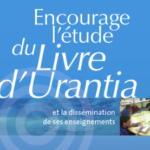 In this article, I wish to share some reflections that have been long maturing, the result of which are experiences in the bosom of different study groups, including one I initiated 16 years ago. In this article, I wish to share some reflections that have been long maturing, the result of which are experiences in the bosom of different study groups, including one I initiated 16 years ago.
In January 2001, arising from various personal ordeals, I found myself in great confusion. Turning to God, I prayed to be led to discover a deeper sense of the notion of love as well as a clearer path in life in the years to come. The response was not slow. In September of the same year, I found myself in a group of long-term readers of The Urantia Book. We were all in the presence of an educator who, very simply, spoke of mankind as a creature of God, carrying on an eternal project of progression and growth, to which one could join without delay and in an active way.
This instructor aroused in me a profound desire to do as he did: to consecrate my life to developing and affirming my relationship with God, to make him known around me, and to start a serious study of the fifth revelation.
I continued my spiritual education with this man by going to Dakar once or twice a year. There I participated in a study group set up in his care for several years, a fraternity beyond institutional religions, cultures, and races to savor the unity of the spirit. To this day, our fraternity has expanded, deepened and intensified. I have participated in both French- and English-speaking groups, from which I have learned.
In parallel, owing to my growing enthusiasm for these truths and the desire to share them, a group has naturally formed around me. A teacher by profession, working for many years with adults, it has fallen to me to animate this little assembly of seven people. Being regularly confronted by the human side, I have felt the necessity to undertake training over the last five years in relationship-communication in order to acquire and develop practical tools to bring myself and others to take responsibility for everything in our lives. Without this acceptance, nothing significant or new can emerge in anyone’s life, even with people desirous of doing the Father’s will.
For three years I have been accompanying people who are in quest of meaning and peace, without necessarily seeking God. A phrase in Laurent Gounelle’s last book, ‘and you will find the treasure which sleeps within you,’ has profoundly attracted my attention: “Spirituality without working on yourself is not worth anything; working on yourself without spirituality is the same.”
This notion has allowed me to deepen my understanding of the study group. I perceive it as the matrix of experiential growth.
The first point that I wish to tackle, arising from observations made during my practice, is that human beings are more and more in search of well-being synonymous with immediate peace, tranquility, and happiness without understanding that true happiness is an internal matter. Besides, humans have a tendency, when taking an interest in a study group, to imagine that it will open, and without delay, the door to that much anticipated state of quietude. The Urantia Book is clear on this subject, and invites us to be in it, just as much as to be with people who are seeking a group: there is a zone of conflict to be crossed, and it doesn’t mention for how long!
The second point that I want to address is the group as the ideal framework for the growth and verification of our own evolution. It is in effect the barometer of individual progression, the measure of the proximity of our Adjuster, as well as of our level of transformation. Here I make an analogy with a musician. To master an instrument, many hours of individual work are required. Every musician who wants to be a part of an orchestra is obliged to have this personal discipline so that it will function well. When all the musicians gather, they harmonize with each other, and the accuracy of the symphony will depend on the personal work of each and on their skill in working together. This supplementary effort is essential.
The group offers a potential space to work on oneself, to reduce the exaltation of the ego that lives in each of us, and the vaunting claims it makes. Participants are continually confronted with different facets of the self, originating from internal tensions, as well as from multiple external relationships in conflict. From then on, the group is no longer simply a place for studying the teachings of the book, nor solely for exchanges of interpretations of the concepts of the fifth revelation, but indeed a place of experiment and transformation. Consequently, a study group is also a working group.
|
|
Gaétan Charland, Canada  During the conference in Amsterdam, I met with a long-time reader and had an interesting discussion with him about the name, nature, function, mission, and goals of study groups. Since then I had a few more discussions about this subject with readers from Europe, North America, Africa, and my local association. In all those exchanges, my goal was to explore what can be done to make study groups more appealing, practical, and useful to the readers and students of both the new and the old generations. During the conference in Amsterdam, I met with a long-time reader and had an interesting discussion with him about the name, nature, function, mission, and goals of study groups. Since then I had a few more discussions about this subject with readers from Europe, North America, Africa, and my local association. In all those exchanges, my goal was to explore what can be done to make study groups more appealing, practical, and useful to the readers and students of both the new and the old generations.
Looking at the directives expressed by the revelators in the Publication Mandate to create thousands of study groups, to train leaders and teachers, and to respond to the challenge to accomplish the mission of The Urantia Book as stated in the Foreword: to expand cosmic consciousness and enhance spiritual perception [0:0.2]—and to answer the other great challenge, to achieve better communication with the divine Monitor that dwells within the human mind [196:3.34], my questions are: Are the study groups fulfilling these goals? Or are study groups organized and facilitated without having any of these specific goals?
From these exchanges, I realized that study groups need to be revisited if they are to accomplish what the revelators possibly had in mind for them. Perhaps doing study groups for so many years and becoming somewhat complacent about them, we may gradually forget about their true purpose and importance while making them more intellectual and social instead of more spiritually progressive and attractive to a new generation of readers.
There is nothing wrong with the intellectual or social aspects of study groups as long has it does not overshadow their real purpose. For many years, there was not much being done to improve how study groups were organized or how they managed themselves, often reasoning that they were freer to pursue activities without any interference from any organization. Today, I believe, if study groups are to succeed in their mission to revitalize the world spiritually by elevating the consciousness of the majority of its inhabitants, Urantia organizations as well as study group hosts need to re-evaluate the true potential of those groups, and devise strategies to help them become more effective and appealing.
If we look at the name “study group” as an example, what comes to mind? For many, it’s mostly the intellectual aspect of the book. Our experiences as students in regular schools have conditioned us to think of study in a very limited way; maybe this appellation needs to be revised to respond better to the needs and mindset of the present generation of readers. Naming them “study groups” might have appealed to the earlier generations of readers, but today I think it needs to reflect and emphasize more its spiritual transformative power, not only its intellectual aspect.
Here is a description of the term “study group” found on the Internet:
A study group is a small group of people who regularly meet to discuss shared fields of study. These groups can be found in high school and college setting, within companies, occasionally primary/junior school and sometimes middle school/intermediate. Professional advancement organizations also may encourage study groups. Each group is unique and draws on the backgrounds and abilities of its members to determine the material that will be covered. Often, a leader who is not actively studying the material will direct group activities. Some colleges actively set up study group programs for students to sign up. Typical college level academic groups include 5-20 students and an administrator or tutor drawn from the graduate program or an upperclassman. Professional groups are often smaller. [Wikipedia]
Does this definition reflect what we are trying to achieve with Urantia Book study groups?
Modifying the name “study groups” would be just a first step in improving how they should be perceived and what they could accomplish. That modified name would have to reflect an orientation compatible with the spiritual mission of The Urantia Book as well as its intellectual dimension in order to enlarge our conception of cosmology, philosophy and religion. It also needs to reflect its transformative and progressive spiritual influence to encompass service-oriented activities. It is for no small reason that the revelators have strongly suggested that we study the time and life of Jesus, so we learn how to become living lights of truth.
You may preach a religion about Jesus, but, perforce, you must live the religion of Jesus. [Paper 196:2.1, page 2091.10]
 The integration of the teachings of The Urantia Book in the life of its students should be one of the priorities of every study group. Such focus and orientation become a necessity when we strive to accomplish the mission that was given to us by the revelators. Many things come to play when we accept the responsibilities that such a mission requires of us, and many things we can do to live up to those responsibilities to the fullest of our capacity. A sincere dedication to participate in the spiritual mission of The Urantia Book is necessary if we hope to revitalize, improve, and modernize study groups. The integration of the teachings of The Urantia Book in the life of its students should be one of the priorities of every study group. Such focus and orientation become a necessity when we strive to accomplish the mission that was given to us by the revelators. Many things come to play when we accept the responsibilities that such a mission requires of us, and many things we can do to live up to those responsibilities to the fullest of our capacity. A sincere dedication to participate in the spiritual mission of The Urantia Book is necessary if we hope to revitalize, improve, and modernize study groups.
“The future is not open to (your)mortal comprehension, but (you) will do well to diligently study the order, plan, and methods of progression as they were enacted in the earth life of Michael when the Word was made flesh.” [The Publication Mandate]
In today’s Urantia movement, the study group hosts are the spiritual lights that shine in many parts of the world; they are leaders and teachers whether they realize it or not. They have a tremendous responsibility and, as a brotherhood, considerable reserve of spiritual potential and power that can help change the world. If we could only imagine and actualize what the revelators foresaw in the potential of study groups, every serious reader and student of The Urantia Book would either participate in one or host one.
Descriptive words of things beautiful cannot thrill like the sight thereof, neither can creedal words inspire men’s souls like the experience of knowing the presence of God. [Paper 195:9.8, page 2083.4]
Study groups should focus more on the progressive integration of the teachings. They need to incorporate the exchange of experiences that enhance the values and meanings of the lessons being studied within the group. Such activities would open the doors to the expression of our spiritual potential in our day-to-day living and could be used to make the teachings more accessible to everyone.
By sharing these experiences, we could explore their spiritual, progressive, and transformative influence on us and others while keeping focused on the teachings. After teaching his Apostles, Jesus always sent them out to practice and teach the lessons learned. In this way, they would acquire firsthand experience by integrating these lessons. Once done, they would all meet again and share what they had learned. This was how the Master organized and managed the study group of his time.
 Today we have access to many new technologies that can help enormously on how we gather for a study group. By means of internet programs like Skype, Zoom or WhatsApp, it is possible for isolated students and readers to meet at their preferred time. The Urantia Book Study Group Directory has a register of more than 80 virtual study groups in many different languages occurring at different times and days of the week. There are also groups that enjoy both meeting in person and in virtual at the same time. There are more than 400 regular groups listed in different directories managed by different organizations. Today we have access to many new technologies that can help enormously on how we gather for a study group. By means of internet programs like Skype, Zoom or WhatsApp, it is possible for isolated students and readers to meet at their preferred time. The Urantia Book Study Group Directory has a register of more than 80 virtual study groups in many different languages occurring at different times and days of the week. There are also groups that enjoy both meeting in person and in virtual at the same time. There are more than 400 regular groups listed in different directories managed by different organizations.
 There is a plethora of study aids available today that were not available many years ago. These study aids can be used to improve the effectiveness of study groups by helping students visualize difficult concepts, or to understand the organization of the universe in its many forms and expressions. Efforts should be made to translate the best of those study aids and make them available in the Study Group Directory, so students of different languages could benefit from the work of other readers. Sharing experiences related to the teachings in newsletters or the Journal is also a great way to give life to the teachings of The Urantia Book. There is a plethora of study aids available today that were not available many years ago. These study aids can be used to improve the effectiveness of study groups by helping students visualize difficult concepts, or to understand the organization of the universe in its many forms and expressions. Efforts should be made to translate the best of those study aids and make them available in the Study Group Directory, so students of different languages could benefit from the work of other readers. Sharing experiences related to the teachings in newsletters or the Journal is also a great way to give life to the teachings of The Urantia Book.
There is also another responsibility that should be endorsed by every student and host of a study group, which is the one having to do with sharing the book and its teachings with the outside world. What better place than a study group to learn about how this can be done? Too often today, we rely on social media to do the work for us, or we relegate to the organizations this fundamental work of our common mission as an advocate of the revelation. Perhaps our hope or our impatience to see rapid changes in society and the world at large, has restrained our progress in the endorsement of our individual spiritual change and influence. We need to become the change that we want to see in the world—doing otherwise is not very effective for our mission.
Believing that The Urantia Book will, by itself, change the world is an immature response to what it contains and stands for—the teachings need to come alive within each one of us; they need to be integrated so as to make us a living expression of their values. Before a tree can grow and become mature, it grows a network of roots. Once this is accomplished, those roots will be the life-giving anchor to this tree, it will help it withstand the adversity of the elements and, as the tree matures, the whole earth will benefit from its many fruits. Study groups are the same; they are the network—the spiritual roots that will anchor the revelation to withstand the adversity of ignorance, prejudice and fear. Its participants are its branches that should manifest spiritual fruits.
Let us dwell on the fact that this revelation was given for the next one thousand years. This is how long the revelators predict it will take to be the lever that will bring this planet to the next era. So why are we in a rush? I have learned one good lesson in my life, and that is “do it well the first time or you will have to do it again later.”
Quality of living, quality of thinking, quality of worship takes a whole life to master, and Jesus has shown us how to do it by the example of his life. To master these three things, we need to acquire the cosmic and spiritual mindset contained in every part of The Urantia Book, not only some part of it. This is where study groups can help, as long as their hosts or facilitators understand and are focused on actualizing these goals.
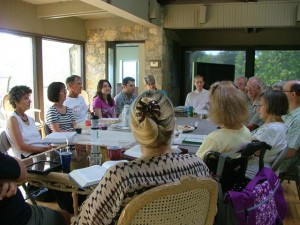 In order for study group hosts to accomplish these goals, they need help to train themselves in the art of leadership, facilitating, and teaching. The network of study groups needs to be strengthened and improved; it needs to grow and have roots in every country of the world and in all the cities and villages of those countries. There are possible solutions to these challenges but many of them will be found by gathering study group hosts and having them engage in productive exchanges with each other. They can benefit and learn from their shared experiences, and organizations can help by offering punctual and regular training as well as places to meet. In order for study group hosts to accomplish these goals, they need help to train themselves in the art of leadership, facilitating, and teaching. The network of study groups needs to be strengthened and improved; it needs to grow and have roots in every country of the world and in all the cities and villages of those countries. There are possible solutions to these challenges but many of them will be found by gathering study group hosts and having them engage in productive exchanges with each other. They can benefit and learn from their shared experiences, and organizations can help by offering punctual and regular training as well as places to meet.
Looking at study groups in such a way, visualizing their true spiritual potential, gives us new insights about their role and how important they are to the mission of the revelation. Isolated or divided through organizational politics or divergent intellectual and spiritual orientation, study groups will fail to accomplish their true purpose or, at worst, will diminish their attractiveness to readers and students alike. Good leaders and teachers in the Urantia movement should spring forth from effective study groups—groups that are focused on their real purpose of intellectually (cosmically) and spiritually uplifting their participants.
Let us all remember that we need to be the change that we want to see in the world [Mahatma Gandhi]. Until we become the living expression of this change, the world will keep spinning as it is now. So, I invite study group hosts as well as their participants to engage in deep thoughts and exchanges about the ideas I am expressing in this article in the hope that in a near future we can all gather together and improve how study groups could benefit the revelation.
|
|
Moustapha N’diaye, Sénégal  In the mid-1970s, guided by our spiritual mentor, a number of like-minded friends and I entered into a new journey of spiritual awakening based on the revelations of The Urantia Book. Our mentor, who had received his copy of the “Urantia Cosmology” directly from a French reader in the 1960s, tailored the guidance he offered us to the sociological reality of Senegal at the time. In the year 2000, some twenty-five years later, we discovered and began working with several other study groups worldwide. In the mid-1970s, guided by our spiritual mentor, a number of like-minded friends and I entered into a new journey of spiritual awakening based on the revelations of The Urantia Book. Our mentor, who had received his copy of the “Urantia Cosmology” directly from a French reader in the 1960s, tailored the guidance he offered us to the sociological reality of Senegal at the time. In the year 2000, some twenty-five years later, we discovered and began working with several other study groups worldwide.
Two years earlier, in December of 1998, we spoke by telephone with a Trustee of Urantia Foundation. A Fellowship member had contacted the Trustee around that same time in an effort to find a local Dakar contact to assist with his Fellowship mission to Africa. He had planned a short stopover in Dakar, along with his companion to pick up a shipment of English copies of The Urantia Book that had just arrived from the Port of Marseille. These books were destined for distribution throughout English-speaking African countries (Senegal is French-speaking) and, together, they had planned to crisscross Africa to carry out their mission.
Because his health precluded his own visit to Dakar, the Trustee arranged for the Fellowship member to visit us. After meeting with our mentor and study group, this man interrupted his plans so that he might spend more time with us. In fact, he stayed as a guest in my Dakar home for a month. While our guest, he joined in the daily study group meetings led by our mentor. Before continuing with his mission, he made us aware of other study group activities throughout the world and left each of us a copy of The Urantia Book.
Since his visit to my home, our study group has hosted visitors from France, Belgium, Holland, Canada, and America. Such visits continue to this day. In turn our mentor, as well as some of our study group members, have traveled to Dourdan (France), Cape Town (South Africa), Chicago (America), Montreal (Canada), Medellin (Columbia), and more recently Amsterdam (Holland) and Accra (Ghana). The experience of these visits, coupled with the many and varied discussions I’ve enjoyed with French and English-speaking readers of The Urantia Book during the past two decades, leads me to share in this article a vision of what may very well be the mission of Urantia Book study groups.
Before I share this vision with you it is important that I first share a little more about Senegal and our Dakar study group.
Senegal is a predominantly Muslim country with Christians, including members of the newly emerging Evangelical orders, comprising about 10% of the population. The peaceful coexistence of religious communities and the practice of confrère Islam, which espouses the social tradition of acceptance of the other, characterizes Senegalese society.
As for our study group, we first encountered our mentor as university students. Our background was Muslim but being Muslim or Christian was unimportant. The recognition of the “God Consciousness” that characterized our teacher was the important thing.
Over the course of several years we engaged in question and answer sessions with him in an effort to understand that “something more.” Ultimately, those sessions led to our request that he more fully explain the beliefs he practiced. And so, it was that our professor became our spiritual mentor and our introduction to the revelations of The Urantia Book began. That was 1981. By the time we received our visitor from the Fellowship our study group numbered over fifty.
Our mentor tailored his teachings to Senegal’s predominantly Muslim character as he led us step-by-step through the messages of The Urantia Book. He offered newcomers to our study group about three years of the same guidance before entrusting their spiritual development, always under his watchful eye, to more long-standing group members.
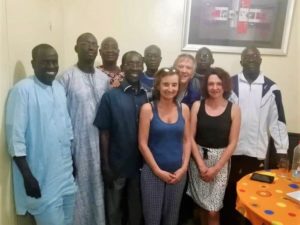 Over the years since we began our study of The Urantia Book, thousands of like-minded people beyond our study group have received the same spiritual guidance from both our mentor and members alike. This guidance took the form of seminars, thematic studies, question and answer sessions, as well as testimonials. The lessons were always based on the teachings of The Urantia Book and were organized to show how spiritual consciousness can lead man to God (the book presents God to man in three parts and concludes in its fourth part with a presentation of the “Man-God or God-Man.”) Once prepared by personal experience, mentorship, and the spiritual strength of the group, each student would receive their own copy of The Urantia Book. Over the years since we began our study of The Urantia Book, thousands of like-minded people beyond our study group have received the same spiritual guidance from both our mentor and members alike. This guidance took the form of seminars, thematic studies, question and answer sessions, as well as testimonials. The lessons were always based on the teachings of The Urantia Book and were organized to show how spiritual consciousness can lead man to God (the book presents God to man in three parts and concludes in its fourth part with a presentation of the “Man-God or God-Man.”) Once prepared by personal experience, mentorship, and the spiritual strength of the group, each student would receive their own copy of The Urantia Book.
This approach facilitates the understanding of The Urantia Book while avoiding the difficulties that seem inevitable at times for those who receive it without being prepared for its truths. For many of us, it also cultivated a spiritual vocation.
The introductory study group session always addresses the individual’s personal relationship with God. This presentation is especially designed so that, should a student choose not to continue with the group, he would nevertheless be sufficiently prepared to pursue his spiritual search independently under the guidance of his Adjuster.
Our group’s presentation on prayer has always been voluntary. If students wish, they can participate in weekly collective prayers (which have since become daily.) These prayers follow an in-depth examination of themes that members suggest particularly as they pertain to society and humanity. This examination is always grounded in God’s underlying plan for Urantia. By the time we arrive at the presentation on the Supreme, students can choose to lead the discussion if they so wish.
Currently those members of our group who have discovered a spiritual vocation work with their students to develop ongoing study plans. For the past fifteen years, these experienced teachers meet weekly to review their activities, plan meetings for the major group, and organize our interaction with readers from other countries, often using the convenience of internet technology. Many of us also participate in Urantia Association activities including international meetings, as well as The Urantia Book Internet School and Urantia Foundation events.
Given this account of our group experience of some forty years, coupled with the enriching experience that our twenty-year collaboration with study groups from different continents provides, we would like to share our vision for a “Second League” that study groups might follow. But first things first.
Study groups must follow a “First League” that necessarily hinges on the message of the Fifth Epochal Revelation—The Urantia Book. This stage can last several years, particularly so when we consider the ever-changing make-up of study group membership. During this “First League,” we must always bear in mind that the contribution of revelation goes well beyond understanding the intellectual and spiritual concepts of The Urantia Book. This first stage, illuminated by the divine fruits of the spirit, leads us through all reality levels of not only our “being” but also of all “beings of good will.” These spiritual fruits transmute our human nature towards the divine by progressively connecting it to the example and teachings of the revelatory personalities who authored The Urantia Book. It has been our experience that the true understanding of spiritual concepts is firstly the result of an inner personal experience and The Urantia Book teachings give us the keys that assure our success. Consider the example conveyed in Part IV—The Life and Teachings of Jesus. It provides the inspiration to illuminate the God-consciousness within each of us that serves as a pole of attraction for others.
Through the message of The Urantia Book, we learn how we can and must believe in God with a more profound understanding. We learn that God never fails to reveal himself in our daily lives and the experience of this truth demonstrates how God relies on us and our ability to know him. The revelators also remind us of the responsibilities that arise from this experience: our responsibility of duty to mankind and duty to God; as well as a third and sacred obligation of service to the brotherhood of God-knowing believers. This reminder is important and vital for study group survival and we need to live and share it more fully.
Beyond any other consideration, we must always keep in mind that, in the Thought Adjuster, we all have a divine fragment in our lives that guides us daily. Together with our Adjuster, the Spirit of Truth makes us realize that our human consciousness unites us in our consciousness of God in more ways than we imagine. Step-by-step we must give ever more importance to study groups, for they awaken a new vision of the world through their truly spiritual, transformative, and practical activities.
Because this vision can be very personal at the beginning, it starts within ourselves and continues with service to our neighbor. This process begins within study groups through three activities that illuminate our spiritual consciousness and cultivate a conscious collaboration with our Adjusters. They are worship, prayer, and service. Together they activate the spiritual influences that nourish our soul and feed our higher consciousness. Large sectors of humanity often neglect these three important activities and they do so for many reasons. Urantia Book teachings outline and clarify those reasons and help us to reintegrate worship, prayer, and service into the center of our spiritual experience of man’s relationship with God.
We believe no particular prerequisite exists that bars our entry into this step-by-step process. The experiences we share with others within the Urantian community, regardless of cultural, racial, or religious differences, only reinforce this belief. To become aware of the divine origin and spiritual finality that we all share it is sufficient to ground our quest and our initiatives within a framework of love for our neighbor and service to our fellows. In the effused spirit of the Master Son and in our soul, the love of neighbor and service to our fellows are in reality one and the same truth.
Let us simply recall the following: Worship reflects our spiritual nature in today’s world. Prayer connects us with powerful objective realities on the spiritual levels of human experience and can change entire families and nations. Service reveals our relationship with God through the Supreme. The inner light, which is the way, the truth, and the life, equips us well and stands ready as our guide.
We believe that study groups already have the diversity necessary to prepare for the spiritual awakening of humanity. By adding a dimension of coordination and harmony to our current study group activities, based on the transformative spiritual exercises guaranteed of success by the Spirit of Truth, we can fulfill the promise of the Master Son who assures us that we can all do it, and even more.
To this end we have renamed our Dakar study group the “Progressive Divine Wisdom Research Group.” This name better reflects our goal, which is to grow our divine natures through our relationship with the Adjuster on the one hand and the manifest will of the Supreme on the other.
Together with the Master Son, the God within us, and Supreme all around us, let us all recognize our Father’s Divine Plan. Let us take on the honor, privilege, and joy of living and sharing his plan in these modern and often troubled times. Let us take on the third and sacred obligation of service to the brotherhood of God-knowing believers. We believe the free-will choice to do these things opens the “Second League” door to study groups. This vision may very well be the mission of Urantia Book study groups going forward.
|
|
Moustapha K. Ndiaye, Sénégal And the peace of God, which transcends all understanding, will guard your hearts and your minds in Christ Jesus. [Philippians 4:7]
O bestow on your people Israel great peace forever, for you are King and the Lord of all peace. … Blessed are you, Yahweh, who blesses his people Israel with peace. [Paper 150:8, page 1685]
Peace be unto you. And unto you, peace.
 Introduction Introduction
Who among us has paused to reflect upon the familiar greeting and response, “Peace be unto you. And unto you, peace?” This essay draws on personal experience and understandings, the testimonials from those who collaborated in its writing, and an assessment of the religious literature of the Far East (particularly the writings of Hinduism, Taoism, and Buddhism), to do just that—pause and reflect on a dynamic and living peace. In so doing, this reflection explicitly relies on the teachings of The Urantia Book and the example provided by the life of Jesus as recounted in Part IV.
We have two goals. The first is to determine the extent to which human and superhuman agents contributed to this much desired peace, despite the unexpected consequences arising from the vicissitudes of our planetary history. And the second, to understand how our experience with the teachings of The Urantia Book reveal the myriad problems of the modern world, the relationship of those problems to a lack of dynamic and living peace, and the practical contributions this revelation can offer for their resolution.
Our immediate observation from this reflection identifies a deep-rooted malaise that characterizes modern times. This malaise, which we refer to as “stress,” has multiple and often unsuspected sources. It results from the external conflicts and internal disturbances that increasingly pervade both our individual lives and society at large. Globalization and the interweaving of economic, cultural, political, religious, and social institutions makes this malaise one the most widely shared perils confronting us today.
This peril results from the decline in our sense of values, a decline that makes life itself seem meaningless. It is evidenced by increasingly frightening acts of antisocial behavior such as collective suicide, mass murder, and the trivialization of life. This unprecedented situation requires unprecedented solutions.
The questions are: How to give meaning to life? What can peace bring to this effort? And what should the nature of this peace be?
The Basic Human Conception of Peace
Simply put, it is my opinion that men and women who are not at peace with themselves due to this stress tend to gravitate towards those they perceive to be more at peace. They instinctively know that such people will offer a sympathetic ear and soothing, judgment-free advice. In such circumstances, experience becomes the master datum for the acquisition of peace.
 The Supra-Human Understanding of Peace The Supra-Human Understanding of Peace
While peace is both the natural state and defining characteristic of the Spirit, it is only through revelation (auto- or epochal-revelation) and personal spiritual experience that we come to understand its purpose and scope.
Peace, in its external and social form, is a dynamic process. It is punctuated by the influences of the Divine Sons as it integrates into the dynamics of evolutionary religions. Just as men and women in stress seek advice from those among them who appear more at peace, so God’s plan provides for experienced mentoring that helps us to face the challenges that arise when we stray from the divine assurance that only living and dynamic peace can confer.
Individual and collective peace on earth is not only driven by human effort but also by the ministry of supra-human personalities. These personalities nurture an ever-deeper appreciation of living and dynamic peace as the planetary ages unfold.
Unfortunately, all too often people tend to deal with the perplexities of life without including the Spirit in their efforts. It is unfortunate because it seems that peace is the nature and defining attribute of the Spirit.
Although the peace of the Lord has not yet become the natural state of our social lives, as each planetary age unfolds under the ministry of the planetary bestowal Sons, we move step-by-step away from the primitive ages of humanity—characterized by fear and ignorance, and their consequences—towards that time when we can all enjoy spiritual peace on earth.
Peace is not the natural state of the material realms. The world first realizes ‘peace on earth and good will among men’ through the ministry of the seraphic souls of peace. [Paper 39:5:5, page 437.4]
This implies that the “Souls of Peace” follow several ages of stabilization as the evolution of mankind moves into alignment with the Divine Plan.
War is the natural state and heritage of evolving man; peace is the social yardstick measuring civilization’s advancement. [Paper 70:1:1, page 783.4]
Planetary ages are coordinated in space, integrated in time, and unified by the Spirit in eternity. They manifest themselves by successive individual and collective contributions to the gradual manifestation of eternity in time, to the eternal now.
Planned for by the Spirit and implemented by the different Sons of planetary bestowal, the progressive individual discovery of peace is the result of this evolution. For the individual its ultimate outcome is fusion with the inner Adjuster and progress towards the ages of Light and Life.
Planetary Bestowals and Peace
It is impossible to probe the current state of the world and consider lasting solutions for peace without taking into account the history of the planet and the divine mechanisms of creation.
The Age of the Planetary Prince
Typically, each planetary bestowal of a divine Son brings with it the building blocks that contribute to the individual and collective establishment of this peace. Among other things, the age of the Planetary Prince should make it possible for mankind to master the forces of nature, lay the foundations of scientific knowledge, and establish a peace that provides for the material security of all people regardless of where they may live. But did our planet, being exceptional, receive the benefit of this bestowal?
The revelators advise us that, at the beginning of the 20th century, those benefits, which had failed to settle in the minds of primitive man, are being rediscovered some 300,000 years later [66:5.18]. Early man simply did not possess the knowledge required to establish the material security necessary for our planet to benefit from the peace that the age of the Planetary Prince typically bestows upon evolutionary worlds. This delay prolonged the reign of fear and ignorance that the ministry of the Planetary Prince normally brings to an end. The disastrous consequences of the Lucifer Rebellion and the experimental work of the Life Carriers compounded the complications and obstacles that contributed to this failure.
The Age of the Adamic Bestowal (Adam and Eve)
The primary mission of the Adamic bestowal was to enhance the evolutionary potential of humankind. This mission was intended to biologically unify the human races and, eventually, erase all traces of racism. This enhancement would have made human nature more sensitive to morontial and spiritual influences.
Because of their default, the Adamic bestowal failed in its mission and this resulted in a deficit of the violet blood required for improved health, a delay in the spiritual outcome of the races through increased morontia sensitivity, and serious complications for the cultural and political aspects affecting our lives today. These failures further complicated the establishment of peace.
The Influence of the Lucifer Rebellion
The philosophical problems and spiritual errors arising from the Lucifer Rebellion compounded the social problems related to the failures of the Planetary Prince and Adamic bestowals.
The Lucifer declaration that the personality of the Universal Father does not exist and is a myth invented by the Sons of Paradise [53:3], has left very deep traces and remains tangible even now in the 21st century. Among other things, this proclamation resulted in the diminution of living faith (especially adoration and prayer) and the perpetuation of the ancestral fears that effectively negate the ultimate goal of destiny. How can we worship a Father who does not exist? How can we pray to a son of a fictitious Father? All that remains is a science and religion largely disconnected from its life-giving roots.
The proclamation of the “equality of mind” and “the brotherhood of intelligence,” not to mention the contradiction of Caligastia’s designation of Lucifer as the “God of Liberty”, added to the diminution of the spirit and worked to separate mankind from anything other than a merely intellectual dimension devoid of any prospect for spiritual achievement. The influences of Lucifer have trapped us in fruitless tautologies that, despite the notable efforts of the prophets and other spiritual educators, led to the absence of spiritual awareness and dealt a great blow to our worldview. However, as we shall see in more detail, these philosophical problems and spiritual errors did not erase the concept of the Fatherhood of God or the Brotherhood of Man from human consciousness.
Calling “the plan of worship” a ploy to serve the ambitions of the Paradise Sons opened the door to various forms of perverse alternatives to worship. These alternatives range through various forms of occultism, esotericism, spiritualism, channeling, and other cultish practices. They attract lost souls, thirsting for salvation. Had mankind the means to probe the mystery of the Divine Plan there would be no desire to pursue these degraded forms of cult mysteries.
Machiventa, Michael, and the Fifth Epochal Revelation
Consider the impact of the third, fourth, and fifth epochal revelations which we combine for the following reasons:
-
- Machiventa (third epochal revelation), guided by of one of the most experienced Adjusters of Nebadon, performed an emergency mission to prepare us for the seventh bestowal of Michael of Nebadon who incarnated as Joshua ben Joseph (fourth epochal revelation).
Joshua ben Joseph, the Jewish baby, was conceived and was born into the world just as all other babies before and since, except that this particular baby was the incarnation of Michael of Nebadon, a divine Son of Paradise and the creator of all this local universe. [Paper 119:7:5, page 1317.1]
2. The Thought Adjuster who guided the mind of Machiventa also served Joshua ben Joseph and is now personalized as the Chief of Personalized Adjusters of Nebadon.
3. The title “Planetary Prince” conferred on Michael of Nebadon following his seventh bestowal was delegated to Machiventa who, together with the twenty-four councilors, now serves Michael in the council of the Planetary Princes of Satania.
Moreover, we now more fully appreciate the contribution to the plan for the establishment of divine peace that resulted from the petition made by a commission of twelve planetary midwayers in the courts of the superuniverse. Their petition resulted in the fifth epochal revelation including Part IV—The Life and Teachings of Jesus.
Current Situation – What Peace?
The conclusions drawn to this point help us understand how and why men have lost the true meaning of spiritual peace despite the inspiration of prophets recorded in religious texts across time and the auto-revelation that emerges through thoughtful reflection. Continuing from here, this essay attempts to coordinate the human idea of peace that has survived with the divine truth of the Spirit’s expression in humanity.
Peace Through Human Traditions and Religions
It is worthy of note that the idea of peace that has survived did so through the great efforts of people who, inspired by God, advanced and installed the material security necessary for spiritual peace.
Judeo-Christian and Islamic Traditions
Psalm 46 is a popular verse that never fails to bring comfort in these stressful times. Its message inspires our efforts to actualize the peace of the Lord, the divine expression of love.
 God is our refuge and strength, a very present help in trouble. God is our refuge and strength, a very present help in trouble.
Therefore, we will not fear, though the earth be removed, and though the mountains be carried into the midst of the sea;
Though the waters thereof roar and be troubled, though the mountains shake with the swelling thereof. Selah.
There is a river, the streams whereof shall make glad the city of God, the holy place of the tabernacles of the most High.
God is in the midst of her; she shall not be moved: God shall help her, and that right early.
The heathen raged, the kingdoms were moved: he uttered his voice, the earth melted.
The LORD of hosts is with us; the God of Jacob is our refuge. Selah.
Come, behold the works of the LORD, what desolations he hath made in the earth.
He maketh wars to cease unto the end of the earth; he breaketh the bow, and cutteth the spear in sunder; he burneth the chariot in the fire.
Be still and know that I am God: I will be exalted among the heathen; I will be exalted in the earth.
The expression, “Be still and know that I am God” is highlighted because it is one of the most well-known and beloved of all Bible verses. This verse is actually more of a wake-up call to be in awe than a gentle call to rest. Understanding its message allows us to approach and understand Asian-inspired works discussed later in this essay.
We could draw a parallel between this Psalm and the following excerpt from The Urantia Book:
One of the most amazing earmarks of religious living is that dynamic and sublime peace, that peace which passes all human understanding, that cosmic poise which betokens the absence of all doubt and turmoil. Such levels of spiritual stability are immune to disappointment. Such religionists are like the Apostle Paul, who said: ‘I am persuaded that neither death, nor life, nor angels, nor principalities, nor powers, nor things present, nor things to come, nor height, nor depth, nor anything else shall be able to separate us from the love of God’. [Paper 100:6:6, page 1101.1]
We can measure the powerful character of this peace even in the face of the greatest disappointments imaginable. Our search for this peace is only possible by recognizing God in ourselves.
This Psalm and The Urantia Book both observe that dynamic and living peace arises in this troubled world when the soul attempts first, to find peace so that everything else falls into place, rather than expecting to find peace after everything has fallen into place.
The more each of us become people of peace the more peaceful society becomes. A man of peace is not only a man in peace but also a man who, by his simple presence, gives peace wherever it is needed. Such a person shines like the sun that illuminates objects by its presence alone. If peace is proportional to the number of people who are at peace with themselves, then each person who strives to achieve personal peace becomes a shining light to transform another.
We are naturally peacemakers via our cooperation with our Adjusters. The Life and Teachings of Jesus exemplify that this drive to restore harmony where it is missing makes us peacemakers and contributes to our spiritual growth. Jesus has shown us the truth of God’s unwavering love by overcoming life’s obstacles and manifesting the will of God.
Our minds and physical being are time and space adaptations of the Spirit. Through his gift to us of divine personality guided by his second gift of a Thought Adjuster, God participates in this peacemaking through our actions. This peacemaking becomes complete once our Thought Adjuster personalizes through fusion with the personality it guides. This fusion can only occur when our human nature fully aligns with the divine within. The peace that only God can confer becomes both the means and the outcome of this fusion.
Because our planetary bestowals of a Divine Son and Adam failed to provide the building blocks necessary for the timely unfolding of God’s “Divine Plan,” we must rely on other influences to compensate for those failures and assist in the installation of peace on earth. What other influences? The Spirit of Truth, the activity of the Supreme, and the ministry of our very capable Thought Adjusters.
These other influences of the Father, Son, and Spirit can lead to the installation of living and dynamic peace provided that we make the willful choice that our Father’s will be done through adoration, prayer, and service.
Asian-Inspired Traditions
It could be said that the Asian mindset is underpinned on the notion of a synchronicity between the material and divine. This could account for the differences in Asian philosophy as compared to the Western worldview that is more causally oriented.
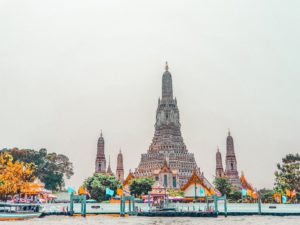 Introduction Introduction
Typically, religious traditions of the Far East address a profound requirement to (re-)connect with the deepest sense of our inner being so that our quest to find peace might help us find “nirvana.” The great teachers who have mastered this tradition exhort their followers to meditate and thereby actualize the potentialities found deep within their being. But this inward focus orphans them from a full understanding of a personalized Father who is both deep within our being and throughout all of creation at the same time. It is the sense of this divine presence that drives us all on our sublime quest.
The main reason for this inward focus, to the omission of all else, stems from Hindu philosophy and the rejection by the Brahmans of the Salem gospel Machiventa Melchizedek tried to introduce [Paper 94:1.5]. The Urantia Book teaches that this rejection was motivated by an Indo-Aryan obsession to preserve the privilege of the Brahman caste and their sense of racial identity [Paper 94:2.1].
This “omission of all else” effectively orphaned them from an understanding of a personalized deity. The powerful philosophy it produced had a similar effect on subsequent Oriental philosophies. Consequently, both Hinduism and Buddhism lack a simple and clear understanding of the personality of the Universal Father as presented by the missionaries of Salem and confirmed through Michael of Nebadon’s seventh bestowal ministry.
…The concept of the Buddha Absolute is at times quasi-personal, at times wholly impersonal — even an infinite creative force. Such concepts, though helpful to philosophy, are not vital to religious development. Even an anthropomorphic Yahweh is of greater religious value than an infinitely remote Absolute of Buddhism or Brahmanism. [Paper 94:11.12, page 1040.3. Emphasis added.]
Nirvana and Spiritual Peace
Although they lack the recognition of a personalized deity, and despite the vicissitudes of history, these Asian-based philosophies still came to a deep understanding of the Self. However, not recognizing that this Self arises from a personalized deity, the Father, they have not achieved a full understanding of the reality of the Self.
While their incomplete understanding does highlight very important concepts and notions as they relate to self-knowledge (know thyself), it can also lead to erroneous conclusions. The conclusions that generally arise from these thoughtful efforts suggest that the death of the ego leads to Nirvana (consciousness of presence in the eternal now) and to the dissolution of the self into a form of impersonal consciousness. This notion of impersonal consciousness, in other words, non-personalized consciousness, can be problematic.
The problem arises from the strict logic of these philosophies, a logic that omits any consideration of a personalized Father. Orphaned in this way, these philosophies cannot delve into the full nature of being and, although they can lead to a comparable state of peace, they have a tendency to push the individual towards prolonged isolation.
Short seasons of retreat from the busy scenes of life may not be seriously dangerous, but prolonged isolation of personality is most undesirable. [Paper 100:5.8, page 1099.6]
This isolation, deemed necessary to master the compulsive self, can end up dissociating the disciple, which then makes it difficult to reconcile society’s current confused state with the sublime peace that the follower may attain through personal isolation. There is simply no bridge connecting the ever-growing gap between the two. Followers of these philosophies often choose to spend their lives as hermits, perhaps revered by society at large but not necessarily of service to humanity. They could run the risk of unwittingly responding to the cry for self-assertion with its call for a precedence of the mind that separates them from the recognition of, and conscious shared participation with, the Father’s spirit.
Meditation that concentrates on breathing, or a thought, or a fixed observation does counter our predilection for convulsive thought. However, what we derisively refer to as “contemplating our navel” cannot and should not be an end unto itself. It cannot produce or replace the worshiping meditation and communion with the inner Spirit that motivates the quest of those who are intuitively aware of the personalized presence of the divine within.
Lessons from Planetary Supervision
Machiventa’s Ministry:
Machiventa exhorted his disciples to carry the message of the gospel of Salem as far as possible. Despite its alteration over the following centuries, his disciples carried this message throughout the known world.
Except for the Far East, where the reaction of Brahmanism as a shield against the teachings of Salem proved detrimental to its message, the Melchizedek teachings became the main unifying thread in human religious traditions prior to the incarnation of Michael of Nebadon as Joshua ben Joseph.
Michael’s Outpouring
The following initiatives undertaken by Jesus would have no doubt helped to extend the gospel of the kingdom to the Far East:
- The two-year training period with the young man from India, Ganid, that possibly provided for a salutary welcome of the gospel of the Father by the philosophies of the Far East which had been orphaned from the concept of the Father.
- The Urmia teachings that expanded religious understanding may have assisted the spread of the traditions of the Eastern version of Christianity, which were less bellicose than the Western version.
- The influence of Abner’s group in Philadelphia that resulted in “The Eastern version of the message of Jesus” [Paper 195:1.11].
- The fifth epochal revelation and current ministry.
Following the respective ministries of Machiventa and Michael of Nebadon and their contributions to the philosophy of the peoples of the Holy Land, God the Supreme takes up these efforts and calls upon all the sons of God to continue this ministry because Nothing of survival value is ever lost in all the wide universe [Paper 109:3.2].
Interestingly, the revelators inform us that they greatly regret that Abner’s teachings, which were in many respects more faithful to the message of Jesus, did not flourish in the later traditions of Western Christianity.
The Peace of Jesus
True peace delivers us from the sufferings of the past and frees us from the anxieties of the future. It incorporates the experience gained from the lessons of the past with the vision of a better future that restores our reason for living. This reality can only be enshrined in the present, in the eternal now, if and when:
- the lessons arising from past failures are learned and corrected through adoration and the guidance of the divine inner presence.
- daily life integrates the faith established in the soul through adoration and prayer with service in the present, the eternal now.
- it is our will that the Father’s will be done.
The incarnation of Michael of Nebadon as Joshua ben Joseph provides the perfect example of Dynamic and Living Peace. This example is especially necessary because, as a consequence of rebellions and bestowal defaults, we were deprived of the building blocks that contribute to the unfolding of this peace. We have not achieved the expected state as provided for by the “Divine Sons” and present elsewhere in the current age of the universe because we have not successfully received these building blocks. Without them, our best recourse is found in spiritual pressure from above, one that benefits from a Father never short of resources.
The outpouring of the Spirit of Truth at Pentecost, which followed the seventh bestowal of our Creator Son, provides the essential lever. It marks the de-compartmentalization of individual destinies and their perfect integration into the plans of God the Supreme for eternal service. The outpouring of the Spirit of Truth combined with the guidance of our experienced Adjusters helps us to overcome the handicaps, insufficiencies, and other obstacles inherited from ages past. Ultimately it leads us into a new age in the evolution of our planetary history.
Lessons to Learn
Recall The Urantia Book teachings that include:
It would be helpful in the study of selfhood to remember:
-
- That physical systems are subordinate.
- That intellectual systems are co-ordinate.
- That personality is superordinate.
- That the indwelling spiritual force is potentially directive. [Paper 112:2.1, page 1227.10]
Also remember that we are blessed with more than a simple animal consciousness. We are endowed with a conscious awareness of the divine: the consciousness of God on the first level; the search for God on the second; and, on the third level, the will to resemble God.
For those who are particularly sensitive to it, this God-consciousness seeks to find expression beyond our inner core of being with a real sense of urgency. However, when confined to the mind for reasons of inaptitude, it is poorly understood and often gives rise to humanism, even atheism.
Nevertheless, the Spirit of Truth is always there to ensure the prodigal son returns home once the illusions of mind that separate us from the reality of being are overcome.
Some final points to ponder:
- Illumination extends beyond thought through revelation.
- Sanctification ensures that “it is our will that the will of God be done.”
- The quest for sanctification is the positive response to the commandment “Be you perfect even as I am perfect.”
- The peace that flows as fruits of the Spirit, always lifts up the soul in the face of the storm and the inertia of the ego.
- Enlightenment only becomes a tool of sanctification when we commit ourselves to doing the Father’s will.
Pax vobiscum.
|
|
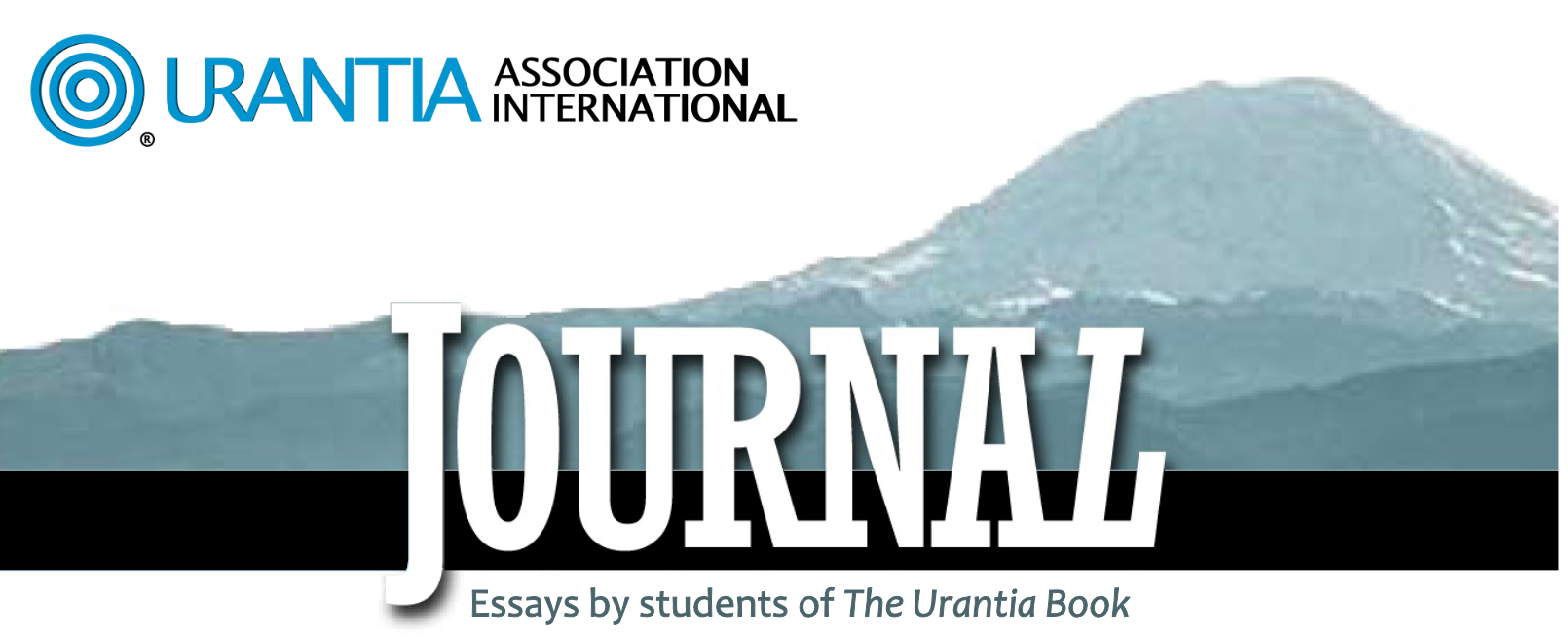
The Journal is produced twice yearly and contains essays, articles and study aids by readers and for readers of The Urantia Book. Any interpretations, opinions, conclusions, or artistic representations, whether stated or implied, are those of the authors and do not necessarily represent the views and opinions of Urantia Association International, the National or Affiliate Urantia Associations, or the editorial team of the Association's Journal.
You can view the entire collection of issues in the archives. All issues before 2017 are downloadable PDF format.
The Journal is currently published in English  , French , French  and Spanish and Spanish  . (There are some older issues that were published in Finnish . (There are some older issues that were published in Finnish  .) You can view the French and Spanish Journals by clicking on the language choices in the pull down menu at the top of the page. .) You can view the French and Spanish Journals by clicking on the language choices in the pull down menu at the top of the page.
Subscriptions
The Journal is available electronically free of charge for anyone with an email address. Join our mailing list to receive free electronic copies.
To receive hard copies, you may subscribe to the Journal at the annual rate of $15.00 USD via any of the following methods:
- To subscribe on line click here
- To subscribe by telephone call: +1-773-572-1180
- To subscribe by check or money order, please send in $U.S. dollars only and make payable to “Urantia Association International”. Mail to:
Urantia Association International
4000 W Montrose Avenue #606
Chicago, IL 60641
Journal Team
- Chief Editor: Richard Jernigan
- Editors: James Woodward, Mark Blackham
- French Newsletter: Alain Cyr and Lucas Perier
- Spanish Newsletter: Olga Lopez
- Communications Chair: Myra Hight
Journal team is currently seeking reports and submissions from all Urantia Book students.
Submission Policy
The Journal editorial team welcomes all article submissions for consideration for current or future issues. Any submissions not used in the current issue are kept on file for potential future use. Urantia Association International does not compensate any author through payment or in any other manner for such voluntary submissions. The Journal editorial team reserves the right to reject or edit materials as it deems necessary for publication and, if edited substantially, will notify the author for their approval.
Send correspondence or article submissions to the above Chicago address or email the Chief Editor, Richard Jernigan.
Images
All contributors — if you submit images, you must either have the rights to those images or they must be in the public domain. In all cases, please include the appropriate credits.
Journal includes images from Pixabay and Unsplash. Many thanks to these companies and their artists for the wonderful service they provide. Image credits are assigned when available.
Citation Guidelines
Please follow our citation guidelines when quoting from The Urantia Book. These guidelines were revised in April 2023, including different citation styles.
Block Quotes
Block quotes are displayed as a separate paragraph, which can be a complete paragraph from the book or any portion thereof. They do not require quotation marks. Block quotes use the citation format shown below, where the first set of numbers refers to paper, section, and paragraph, and the second set refers to the page and paragraph of the editions of The Urantia Book as published by Urantia Foundation. Please note the punctuation.
The Universal Father is the God of all creation, the First Source and Center of all things and beings. First think of God as a creator, then as a controller, and lastly as an infinite upholder. 1:0.1 (21.1)
If you wish to emphasize words that are not already emphasized in The Urantia Book, add “emphasis added” at the end of the page reference.
First think of God as a creator, then as a controller, and lastly as an infinite upholder. 1:0.1 (21.1) emphasis added
Run-in or In-line Quotes
Run-in quotes form an integral part of your own paragraph. Put these quotes within quotation marks (no italics). They require only a short form citation including paper, section, and paragraph. Notice that the citation is included as a part of the quote with the period (full stop) following the quote. For example:
The Urantia Book starts out with a positive assumption, "The Universal Father is the God of all creation” (1:0.1).
Any run-in quote exceeding four lines should be separated out as a block quote. And similar to block quotes, any emphasis added to a run-in quote requires adding "emphasis added" to the citation.
Paraphrasing
If you paraphrase a quote, or derive information from any paragraph, use the same run-in quotation style.
The Universal Father is portrayed in The Urantia Book as a creator, controller and upholder (1:0.1).
References to other works
If you use quotes from, or make references to, other works, please include a citation in order to avoid plagiarism.
In these cases, mention Author, Title, and Year, either in the text or immediately following a quote. Alternatively, include the citation as a numbered footnote.
Size of Submissions
Please limit the size of your submission to 4,000 words or less. We encourage you to use your own words as much as possible and to avoid overusing quotes from the book. Direct quotations are more effective if they are used sparingly and for emphasis.
We always welcome articles about personal spiritual experiences as well as those with fresh insights and new perspectives. Also of interest are thematic studies and articles that compare, evaluate, or integrate academic research (scientific, social, religious, or otherwise) with the teachings of The Urantia Book.
|
|

